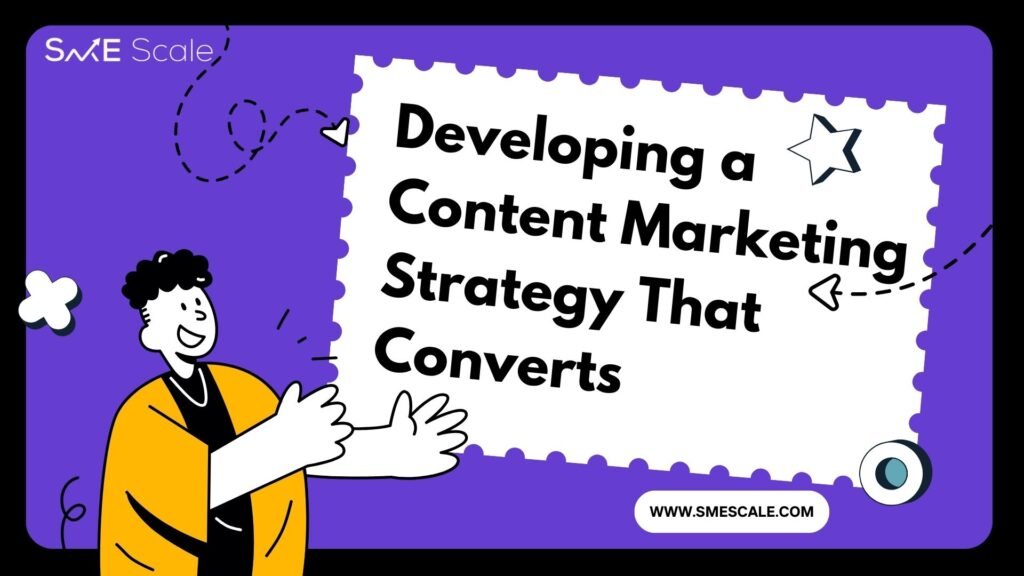Developing a Content Marketing Strategy That Converts: Lessons from SME Scale

Content marketing has become an indispensable tool for businesses aiming to engage their audiences and drive meaningful actions. SME Scale, a consultancy known for empowering small and medium-sized enterprises (SMEs), has mastered the art of developing content strategies that resonate and convert. This blog will guide you through the steps of creating a content marketing strategy that delivers results, using a real-life case study from SME Scale and psychological insights to illustrate the impact of effective content marketing.
Why Content Marketing Matters for SMEs
Content marketing is more than just creating blog posts or social media updates. It’s about delivering valuable, relevant content to your audience, nurturing trust, and guiding them through the buyer’s journey. Here’s why it’s essential:
Builds Authority: Consistent, high-quality content positions your business as an expert in your industry.
Engages Audiences: Tailored content addresses pain points and keeps your audience coming back.
Generates Leads: Effective calls-to-action (CTAs) within your content can drive conversions.
SME Scale’s own content marketing strategies emphasize these benefits, showcasing their expertise and value to potential clients.
Steps to Developing a Winning Content Marketing Strategy
1. Define Clear Goals
Start by identifying what you want to achieve. SME Scale’s goal for one of their clients, a regional tech startup, was to increase website traffic and generate qualified leads.
Actionable Tip: Your goals might include:
Increasing brand awareness.
Driving more traffic to your website.
Nurturing leads through the sales funnel.
2. Know Your Audience
SME Scale leverages AI-powered tools to analyze customer behavior and preferences, allowing them to craft highly targeted content. You can replicate this by:
Creating audience personas.
Using analytics to understand your audience’s behavior.
Collecting direct feedback through surveys or interviews.
Psychology Insight: When content speaks directly to a reader’s needs and desires, it taps into their emotions, increasing the likelihood of engagement and action.
3. Develop a Content Plan
A well-structured content calendar is crucial for consistency. SME Scale helped their client create a six-month content plan focusing on blog posts, social media updates, and gated content such as eBooks and webinars.
Actionable Tip: Include the following in your plan:
Topics aligned with audience interests.
Types of content (e.g., blogs, videos, infographics).
Publishing schedules.
4. Optimize Content for SEO
SEO is the backbone of effective content marketing. SME Scale’s strategy involved optimizing their client’s blog posts with keywords that reflected search intent.
Actionable Tip:
Use tools like Google Keyword Planner to find relevant keywords.
Focus on both short-tail and long-tail keywords.
Optimize meta descriptions, headings, and image alt texts.
5. Leverage Multi-Channel Distribution
Content marketing doesn’t stop at creation—distribution is equally important. SME Scale’s client shared their content across social media platforms, email campaigns, and industry forums to maximize reach.
Actionable Tip:
Repurpose content for different platforms (e.g., turn a blog post into a LinkedIn article).
Use email marketing to distribute content directly to subscribers.
Partner with influencers or industry leaders to amplify your reach.
Real-Life Case Study: SME Scale’s Content Strategy Success
A regional tech startup approached SME Scale to help boost their digital presence and generate leads. Here’s how SME Scale’s content marketing strategy delivered measurable results:
Audience Insights: SME Scale’s AI tools identified the client’s target audience’s key challenges, such as understanding cloud technologies.
Content Creation: SME Scale produced a series of blog posts and webinars that simplified complex topics, positioning the client as an industry thought leader.
SEO Optimization: Each piece of content was optimized with targeted keywords, improving the client’s search engine rankings.
Engagement Metrics: The client saw a 40% increase in website traffic and a 25% growth in lead conversions within six months.
Psychology Insight: By addressing their audience’s pain points and simplifying technical jargon, SME Scale tapped into the psychological principle of reducing cognitive load, making the content more accessible and engaging.
Psychological Principles Behind Effective Content Marketing
Understanding your audience’s psychology can significantly enhance your content strategy:
Storytelling: Stories are memorable and emotionally engaging. Use them to illustrate how your products or services solve problems.
Social Proof: Testimonials, case studies, and reviews build trust and credibility.
Reciprocity: Offering free, valuable content creates a sense of obligation, encouraging prospects to engage with your brand.
Measuring the Impact of Your Content Marketing Strategy
Track these key performance indicators (KPIs) to evaluate your strategy’s effectiveness:
Website traffic and page views.
Engagement metrics, such as time on page and social shares.
Conversion rates from calls-to-action.
Lead generation and sales growth.
SME Scale’s client success story demonstrates how a strategic approach to content marketing can drive tangible results.
Conclusion
Developing a content marketing strategy that converts requires a mix of data-driven insights, audience understanding, and psychological principles. SME Scale’s proven approach offers a blueprint for success, showing how thoughtful content creation and distribution can achieve business goals.
By applying these strategies to your own business, you can build a content marketing machine that not only engages your audience but also drives meaningful conversions. Let SME Scale’s expertise inspire you to elevate your content game and achieve sustainable growth.

